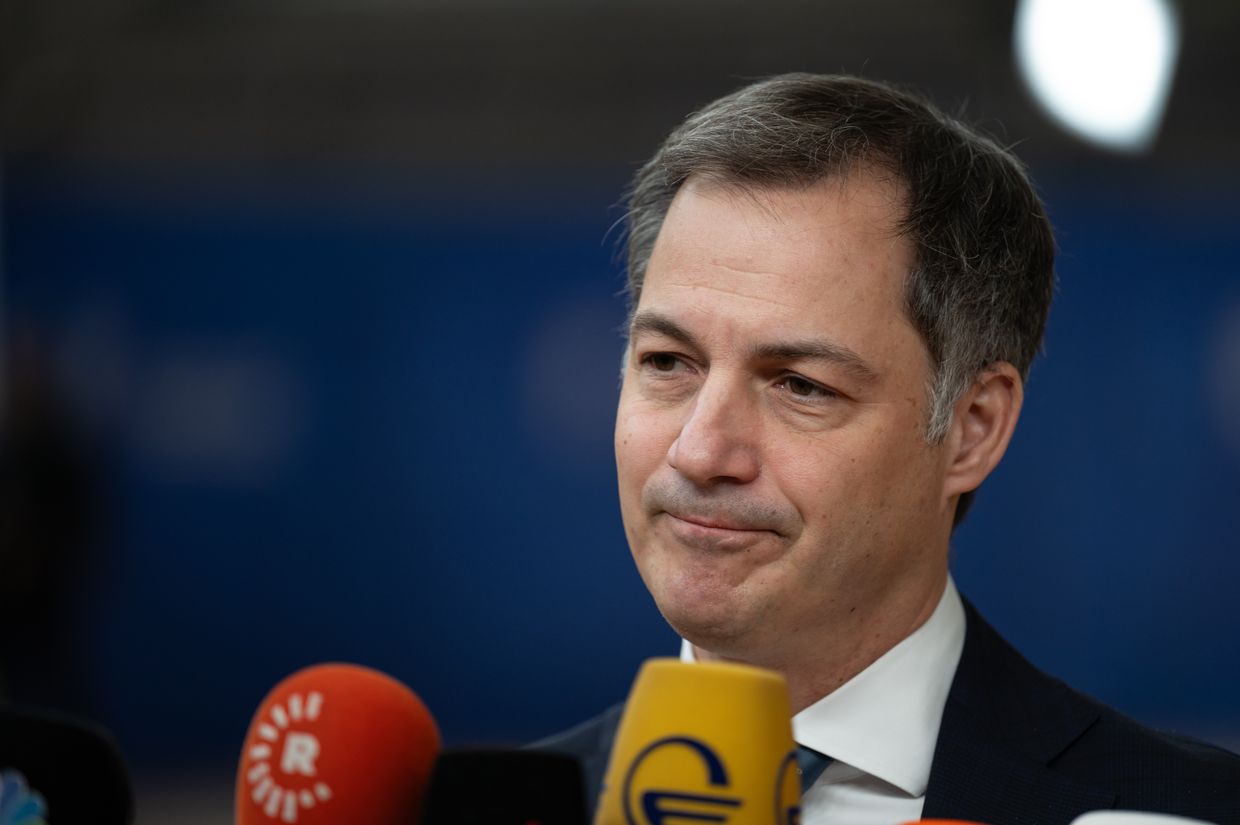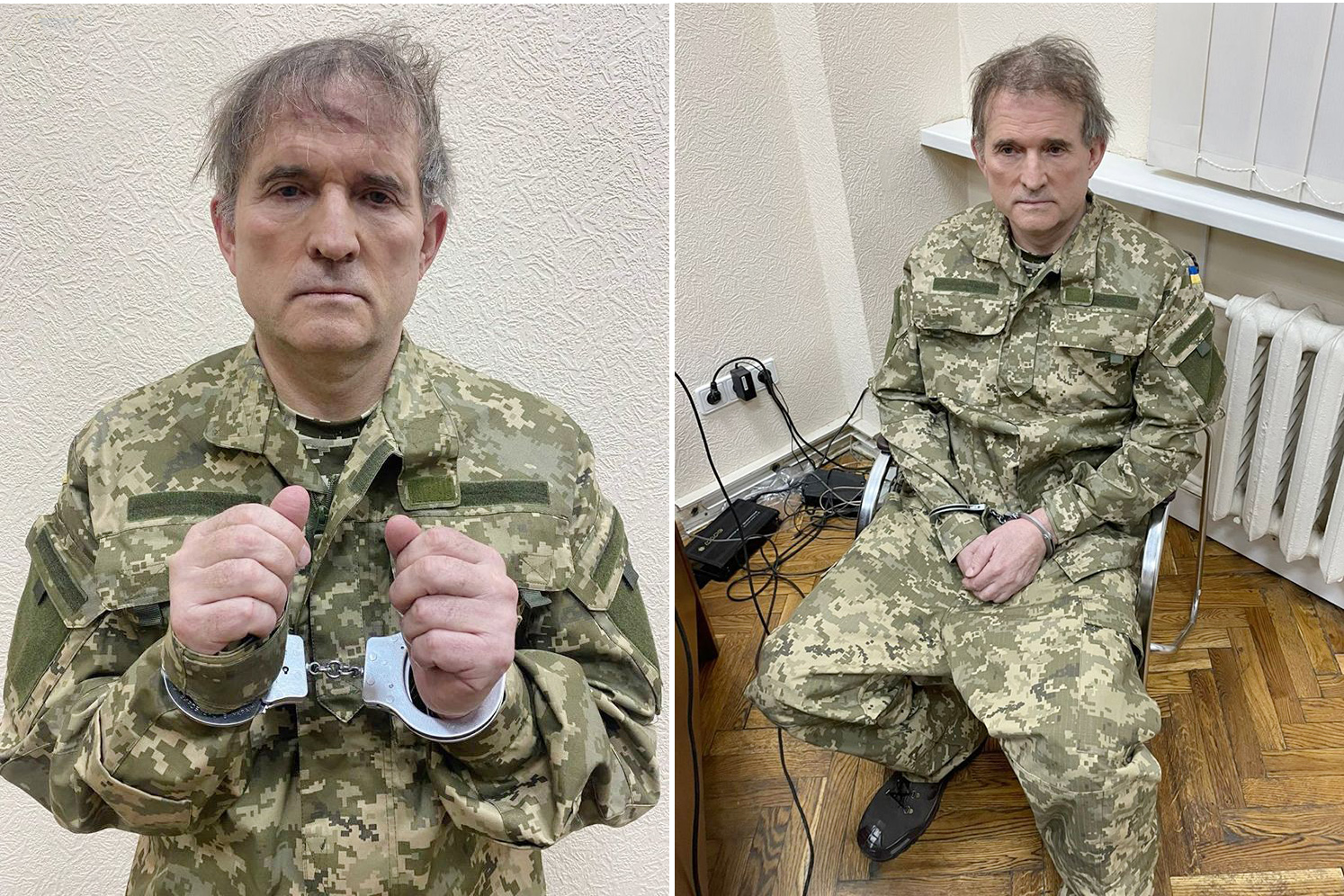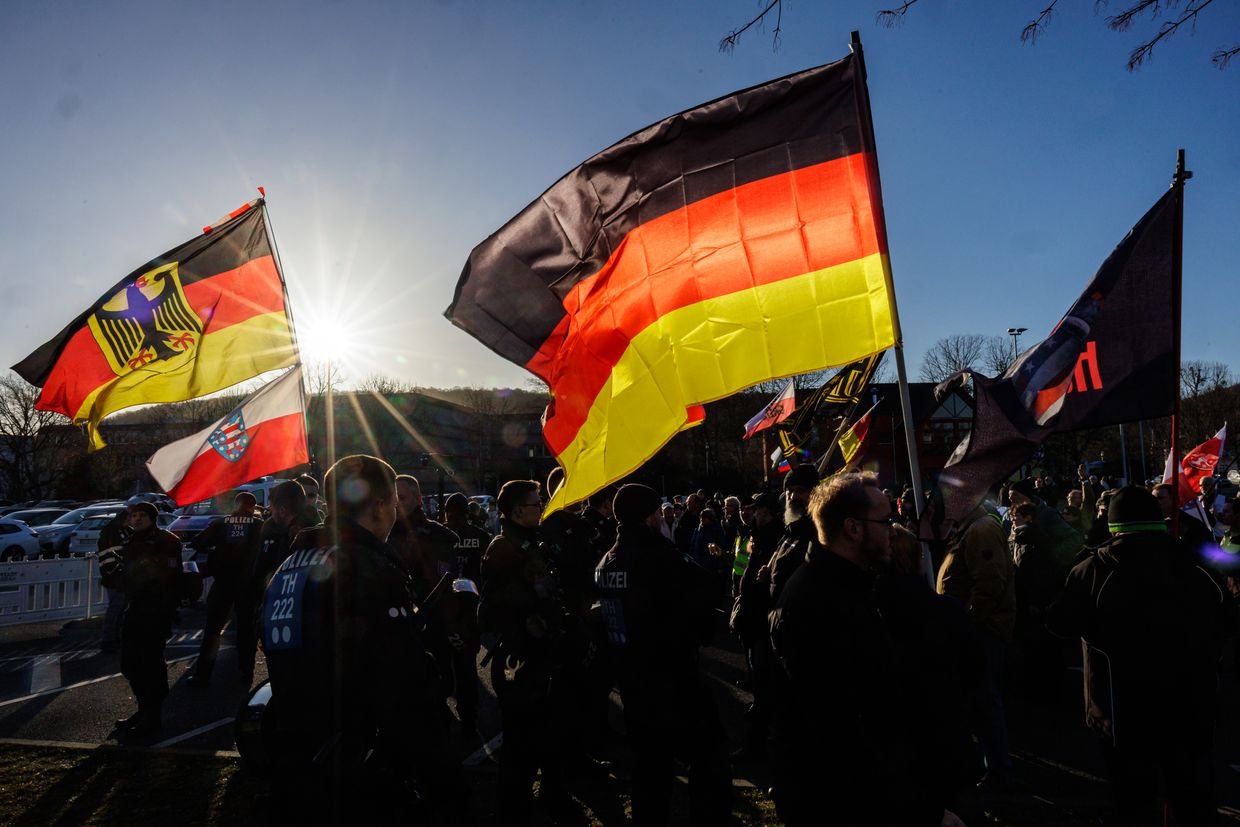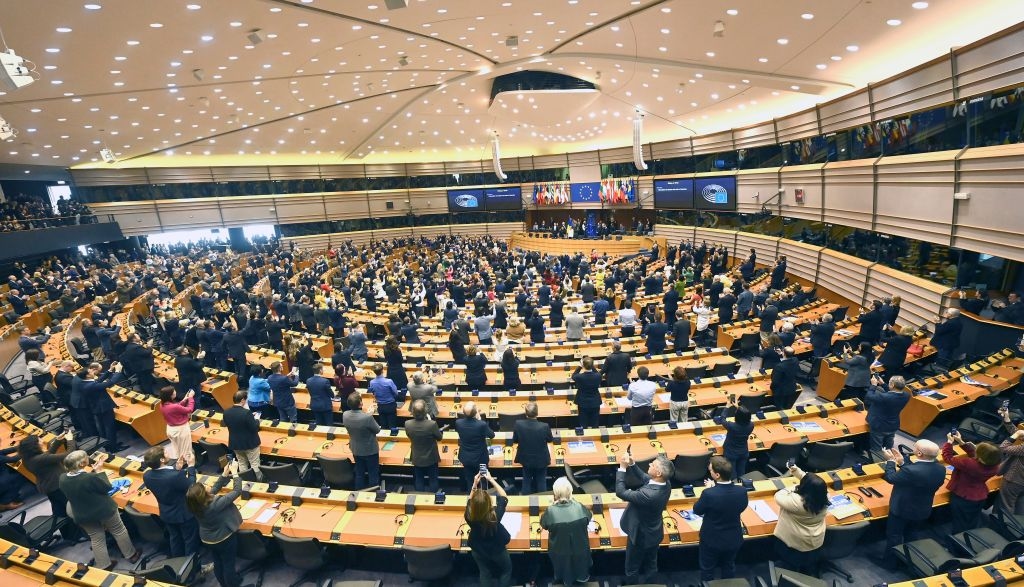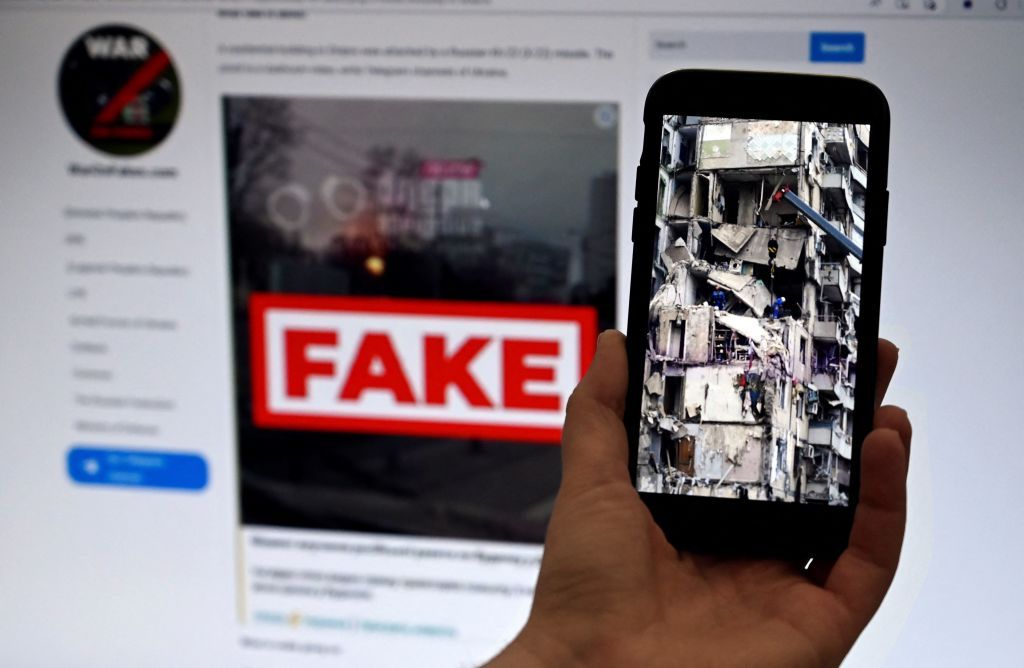How Czechia busted Russian propaganda network targeting European elections

The Czech government announced on March 27 that it had uncovered a Moscow-financed propaganda network that sought to influence European politics and turn public opinion against aiding Ukraine.
Prague named Viktor Medvedchuk, a Kremlin-linked former Ukrainian oligarch, and Artem Marchevskyi, a media manager who used to work at one of Medvedchuk's TV channels, as the people behind the operation.
Their activities, carried out through the Voice of Europe website, reportedly centered around the promotion of pro-Russian narratives and paying Moscow-friendly politicians ahead of the European Parliament elections.
According to the Czech outlet Denik N and Germany's Spiegel, hundreds of thousands of euros went into the hands of politicians from Germany, France, Poland, Belgium, the Netherlands, and Hungary, partially in cash and partially in cryptocurrency.
The cash flow from Moscow to Europe was meant to amplify voices opposing arms to Ukraine, promoting it as the best way to quickly end the war, Denik N wrote.
The revelations sent ripples through the continent, hinting at the extent of the Kremlin's subversive operations in Europe.
Soon after Prague's announcement, other European leaders confirmed that members of the European and national parliaments were on the receiving side of the cash flow but stopped short of providing names.
"We again see the massive extent of lies and disinformation with which (Vladimir) Putin's regime wants to shake trust in our democracy, stir up anger, and manipulate public opinion," German Interior Minister Nancy Faeser said in a comment for Spiegel.
Faeser added that it was "important that this influence operation was uncovered before the European elections," calling the revelations a "blow against the Russian propaganda apparatus."
While its powers are relatively constrained in comparison to national parliaments, the European Parliament plays an important role in the EU's legislative and budgetary processes. The body also approves or rejects candidates for the president and other members of the European Commission, the EU's executive arm.
Members of the European Parliament (MEPs) can be exploited as agents of influence of third parties in several ways, says Matej Kandrík, the director of the Adapt Institute, a Slovak security think-tank.
"Individually, they can organize or support various events, such as European Parliament study visits, expert roundtables, or policy and advocacy briefings, to build influence networks, recruit new assets, or gather intelligence," Kandrík told the Kyiv Independent.
"They can also harness significant public outreach through traditional and social media for their political messaging," he added.
"In groups, they can act as effective spoilers disrupting procedures and debates within the parliament, which has the potential to cause further fragmentation and dysfunction," Kandrík said.
Russian Voice of Europe
The key link in the scheme was the Prague-based news site Voice of Europe. The website has been offline as of last week, but its social media accounts are still accessible and reveal content full of anti-EU, anti-migration, and anti-Ukraine messaging.
Voice of Europe also featured interviews with known populist and far-right politicians, including figures from Germany's Alternative for Germany (AfD), France's National Rally, and Belgium's Vlaams Belang.
According to the Czech media, Voice of Europe began to operate in its current form in the spring of 2023. Around that time, it caught the interest of Czechia's counter-intelligence agency the Security Information Service, known as BIS, which allegedly led the case in cooperation with the Security Service of Ukraine (SBU).
The eponymous legal entity under which Voice of Europe is registered lists Polish citizen Jacek Jakubczyk as its sole executive director since March 2023.
This is not where the Polish trace ends: Poland's internal security agency, the ABW, carried out searches in homes and businesses in Warsaw and Tychy on March 27 as part of its crackdown on the network, seizing 48,500 euros ($52,400) and $36,000 in cash, as well as computer data and mobile phones.
According to Spiegel, the addresses of the places targeted in the raids could be traced to the Polish citizen registered as the owner of Voice of Europe LLC. Presumably, this referred to Jakubczyk.
Czechia's counter-intelligence believes, however, that the website was actually run by Marchevskyi under instructions from Medvedchuk. Both men ended up on Prague's sanctions list, along with Voice of Europe.
Medvedchuk is a well-known name in Ukraine. A former politician, media magnate, and oligarch, he was widely regarded as Putin's point man in Ukraine before the ful-scale invasion. Medvedchuk was one of the co-founders of the now-banned pro-Russian party, Opposition Platform – For Life.
The oligarch was one of Ukraine's chief advocates for closer ties with the Kremlin and Putin, who was a godfather to Mevedchuk's daughter.
Medvedchuk's role in the Prague-based media and influence operations comes as little surprise given his experience with running a private media empire.
ZIK, NewsOne, and 112 Ukraine, three pro-Russian TV channels believed to have been owned by Medvedchuk, were blocked in February 2021. The man himself was charged with high treason in May 2021.
Medvedchuk attempted to flee at the outbreak of the full-scale invasion but was arrested in April 2022, only to be exchanged for Ukrainian prisoners of war in September of that year.
In January 2023, Medvedchuk was stripped of his parliamentary seat and Ukrainian citizenship. He now lives in Russia, where he launched the "Second Ukraine" project centered around parroting Russian propaganda talking points.
Marchevskyi, the other name linked to the disinformation network, is a pro-Kremlin propagandist with Ukrainian and Israeli citizenship. He was the general producer at Medvedchuk's 112 Ukraine channel, as well as a member of the Opposition Platform – For Life party. According to Denik N, Marchevskyi resides in Prague.
The Czech government said that Marchevskyi "effectively runs the Voice of Europe LLC and facilitates financial cooperation with journalists and clandestine funding for select candidates in the European Parliament elections in several EU countries."
"Marchevskyi played a crucial role in taking over Voice of Europe LLC as a tool for influence operations and to spread disinformation and propaganda targeted against Ukraine's territorial integrity, independence, sovereignty, stability, and security," the statement in the Czech sanctions list read.
The propagandist reportedly worked "on Medvedchuk's instructions." Prague said that Medvedchuk "remotely and covertly finances Voice of Europe LLC to publish media outputs on the Voice of Europe website and on its social media accounts."
Russia's parliaments
"Russia has approached (members of the European Parliament)" and paid them "to promote Russian propaganda here," Belgian Prime Minister Alexander de Croo said in Brussels on March 28.
This also happened "in our country, in the highest levels of our democratic institutions," de Croo stressed, without revealing any names.
"It is a threat to our democracy, to our free elections, to our freedom of speech, to everything," said his Dutch counterpart, Mark Rutte, while remaining equally tightlipped about the culprits' identities.
A joint investigation by Denik N and Spiegel claimed that one of the politicians suspected by Western security services of being paid by Russia is German AfD lawmaker Petr Bystron. When confronted with the accusations by the journalists, the far-right politician answered evasively but eventually dismissed the claims made against him as "slander."
Bystron is known for his opposition to Berlin's support for Ukraine. He denounced Chancellor Olaf Scholz's decision to supply Kyiv with modern Leopard 2 tanks, saying the decision had "thrown the fundamental principles of Germany's post-war foreign policy overboard."
An investigation by German Correctiv and Lithuanian LRT also uncovered that Bystron secretly visited Russia's ally Belarus in November 2022, at the time when the full-scale war was in full swing.
His colleague from AfD, MEP Maximilian Krah, visited Medvedchuk during his home arrest in 2021 and was interviewed by the Voice of Europe site.
Both Bystron and Krahl are AfD's candidates for the European Parliament elections.
AfD's spokesperson told Spiegel that the party's leadership would "seek conversation" with both Bystron and Krahl. At the same time, AfD is not coy about its amicable stances toward Russia and opposition to Ukraine aid.
The latest revelations are only the latest proof of Russia's creeping campaign to sway the results of the European June elections in its favor. Recent polls show that the Identity and Democracy parliamentary group, which unites far-right and oftentimes Moscow-friendly forces, competes for third place with the liberal Renew Europe.
In early March, Le Monde reported that French intelligence was investigating Jean-Luc Schaffhauser, who was a member of the European Parliament between 2014 and 2019 for the far-right National Rally, over links to pro-Moscow actors.
According to Le Monde's source, Schaffhauser's campaign was aided by pro-Russian far-right figures, such as former National Rally member Guillaume Pradoura.
"French intelligence believes that he (Pradoura) left a trace not only with Schaffhauser but also in the Netherlands, Belgium, Poland, and Germany," Le Monde wrote. Pradoura previously worked as an assistant to AfD's Krahl and now works for Dutch MEP Marcel de Graaff, a member of the far-right Forum for Democracy (FvD).
According to Denik N, French security services based their investigation on information from their Czech counterparts.
In a separate case, the independent Russian media outlet The Insider reported on Jan. 29 that Tatjana Zdanoka, a long-serving member of the European Parliament from Latvia, is allegedly an agent working with Russian intelligence services.
Politico wrote on March 5 that Russian intelligence services are also using a Serbian national named Novica Antic to infiltrate EU institutions and spread pro-Kremlin views. Antic, allegedly an "active agent of influence" of Russia's Federal Security Service (FSB), was said to have met with members of the European Parliament.
The European Parliament said it was "looking into" the accusations made by Czech counter-intelligence, while several politicians called for "severe punishments" for the perpetrators.
"As the Czech case showed, trust between intelligence services and their 'political masters' is a prerequisite for effective executive response to similar attempts of hybrid influencing and meddling with election integrity," Kandrík said.
"Otherwise, the work of intelligence services may easily end up never being used."



